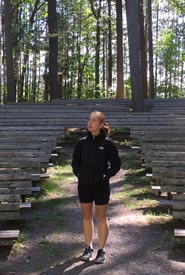Women in conservation: Julie Vasseur
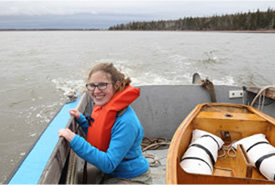
Julie Vasseur (Photo by Mike Dembeck)
In honour of International Women’s Day (March 8), we’re celebrating eight female conservationists at the Nature Conservancy of Canada (NCC) who are working to create a stronger future for Canada’s landscapes.
Julie Vasseur’s life-long love for nature stemmed from a childhood immersed in Canada’s great outdoors. Passed down from her nature-loving dad, Julie was exposed to adventures, camping and exploring at a young age.
But what really got her hooked on conservation was a family trip to Forillon National Park in Quebec. It was there that Julie and her sister saw whales breaching in the Atlantic Ocean, igniting a flame in her to pursue a career in wildlife biology.
As NCC’s program director for Prince Edward Island, Julie gets to see all sorts of critters while out on NCC’s properties. Although they may not be as large as whales, their impact on conservation — and on Julie — is just as huge.
Read my interview with Julie below:
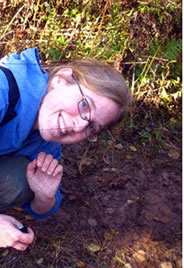
Julie Vasseur (Photo by NCC)
RB: What did you study in school and where?
JV: I have a bachelors of science in biology from Crandall University in Moncton, New Brunswick (when I graduated, it was called Atlantic Baptist University), and a diploma in wildlife conservation technology from Holland College in Charlottetown, Prince Edward Island.
RB: What was your first job in the environmental/conservation/science field? What did you learn in this position that has helped you now?
JV: My first job in the conservation field was actually as a conservation intern for NCC! I was hired for the summer of 2011 to monitor NCC nature reserves across New Brunswick and Prince Edward Island. The internship began right after I graduated from Holland College, so it was great to be able to apply those skills immediately into the workforce — it really helped enforce the knowledge I had picked up at school.
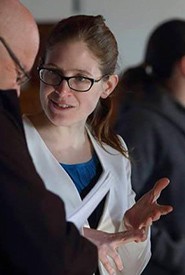
Julie Vasseur, NCC Program Director, PEI
I learned a lot over those four months at NCC — working independently, working in a busy, non-profit environment (where people will help you if you ask!), time management, office administration, applied conservation science...you name it, I learned it. I was a bit of a late bloomer in the field, having only gotten my first conservation job at 25, so I recall being very eager to catch up and absorb as much as I could to prove myself.
RB: Describe a typical day at NCC for you.
JV: My office work and my field work are very different; my main tasks are to track down securement opportunities on Prince Edward Island and then facilitate the acquisition process from beginning to end. This generally includes daily conversations with external contractors (lawyers, appraisers, surveyors, etc.) and troubleshooting any problems that may arise. When I’m not doing that, I’m juggling a variety of tasks from all different NCC departments (science, Stewardship, outreach, development, communications). I’m the only staff person on the Island so I’ve learned to wear different hats well.
In the field season, I make a point of visiting our nature reserves even though it’s hard to get away from the office. In addition to the energy boost I get from being outside in nature, there’s something very fulfilling about going to a natural area that you’ve helped conserve and knowing that it will stay that way. I’ll work away at actions that we need completed on the particular reserve (cleaning up garbage, installing a sign, etc.) and keep my eyes and ears open for any species that we may not have already recorded for the property.
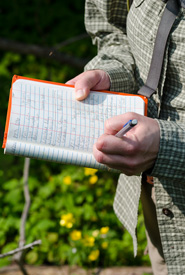
NCC's Julie Vasseur records tree species in a quadrant of Holman's Island, PEI. (Photo by Sean Landsman)
RB: Why is it important for women to be in science and conservation?
JV: We sabotage ourselves by only considering the knowledge and perspective of 50 per cent of the scientific population, especially in a field that is supposed to be objective. Although this was much more prevalent in past decades, it’s by no means eliminated as a social issue.
We delay our own scientific progress when we discourage anyone from pursuing academic research and study.
RB: What advice do you have for women looking to make a career in the sciences or, more specifically, the conservation field?
JV: Take initiative. Work the extra hours and try doing that task you’ve never done before. Leave your comfort zone.
If you get an internship, you’re not “just an intern,” so don’t consider yourself that way. Volunteer to do things above your pay grade and job title, especially if you know you have the skills to do them.
Pay attention and listen to everything.
Take that contract across the country. Don’t expect a full-time job right out of school, especially in conservation.
Learn more about Julie's work and what's happening in Prince Edward Island.

